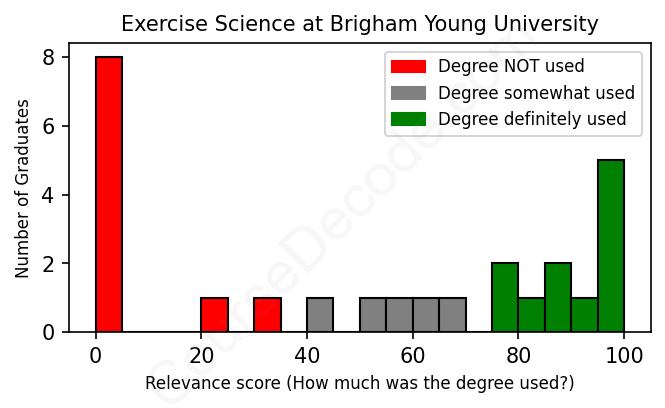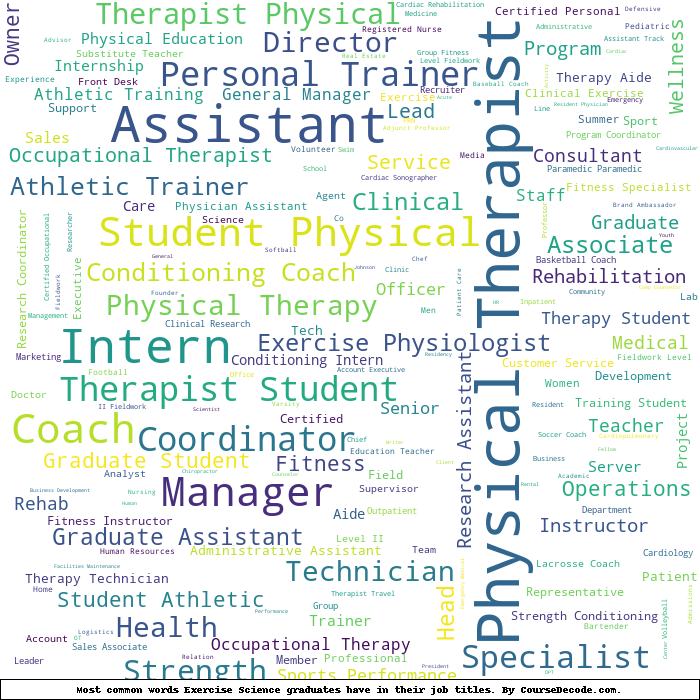
First, some facts. Of the Exercise Science graduates from Brigham Young University we've analyzed , here's how many have used (or NOT used) their degree in their career:

These are estimates based on AI analysis of 26 LinkedIn profiles (see below).
The verdict? Significantly below average. Overall, with an average relevance score of 51%, Exercise Science graduates from Brigham Young University have a much lower likelihood (-16%) of finding work in this field compared to the average graduate across all fields:
And for comparison, here's the chart for all profiles we've looked at across all degrees.
Also, after graduating, 65% of these graduates have pursued further education other than another Bachelor's degree (such as a Masters degree or other), compared to the average across all profiles of 35%. This suggests you may need more than just a Bachelors degree to be competitive as a Exercise Science graduate.
See the details:
|
Relevance score: 0% We think this person has NOT gone into a career related to their degree. We think this person has NOT gone into a career related to their degree.
DEGREE INFOGraduated in 2017 from Brigham Young University with a Bachelor of Science - BS in Exercise Science. Also pursued further education since (see below). JOB HISTORY SINCE GRADUATIONOptometrist Intern Eye Foundation Of Utah Jun 2020 - Nov 2020 Optometrist Intern  Massengale Eye Care Dec 2020 - Feb 2021 Optometrist  Waite Vision Jul 2021 - Present FURTHER DEGREES DONE SINCE GRADUATINGDoctor of Optometry - ODUnknown college 2017 - 2021 ABOUTNo information provided. |
The top 10 most common jobs done by the graduates we've analyzed (ranked most common to least) are:
Here is a visual representation of the most common words in job titles for Exercise Science graduates (this is across all Exercise Science graduates we've analyzed, not just those who went to Brigham Young University):

Graduates with a degree in Exercise Science from Brigham Young University seem to be on a pretty focused trajectory towards careers related to health and fitness. Right after graduation, many of them land jobs in personal training and physical therapy roles, which makes sense given their background. For instance, we see roles like Personal Trainer or Physical Therapist Assistant popping up quite frequently as their first jobs. This hands-on experience not only helps them apply the knowledge gained during their degree, but it also positions them well for professional growth in a field that values practical skills.
Fast forward five to ten years, and the career paths start to vary a bit more, but a lot of graduates continue in healthcare or fitness-related fields. Many end up as licensed Physical Therapists, which is a solid career choice given the demand for such professionals. Others move into management or more specialized roles within healthcare, indicating that they're not just staying stagnant but are instead climbing the ladder. Some do venture into more unexpected roles, like marketing positions or even opening their businesses, showing that a degree in Exercise Science can provide a diverse foundation. Overall, while there are some diversions, many graduates appear to be successfully carving out careers that are relevant to their studies, suggesting that there’s a strong connection between their education and their career trajectories.
Honestly, a Bachelor’s degree in Exercise Science, whether at BYU or somewhere else, is kind of a mixed bag in terms of difficulty. It definitely has its challenging moments, especially when you’re diving into anatomy, physiology, and biomechanics, but if you’ve got a passion for fitness and health, it can also be really enjoyable! Most students find the hands-on labs and practical experiences pretty engaging, which makes the workload feel a bit lighter. Overall, it’s probably around average in terms of difficulty compared to other bachelor’s programs—if you're committed and interested, you can definitely handle it!
Most commonly, in the LinkedIn profiles we've looked at, it takes people 4 years to finish a Bachelor degree in Exercise Science.
Looking at the job trajectories of these BYU Exercise Science grads, it seems like they've carved out some pretty decent career paths, with most likely making a solid income over time. The folks who moved into positions like VP of Operations or even Oral Surgeons are definitely raking it in compared to entry-level gigs like personal trainers or assistants. A good number of them have shifted into more specialized roles in physical therapy or health care, which often come with better pay. While some may have started in lower-paying jobs, many seem to be climbing the ladder quite nicely, so overall it seems like they're doing pretty well financially!
Here is a visual representation of the most common words seen in the "about" section of LinkedIn profiles who have a Bachelor degree in Exercise Science (this is across all Exercise Science graduates we've analyzed, not just those who went to Brigham Young University). This may or may not be useful:

Here are all colleges offering a Bachelor degree in Exercise Science (ordered by the average relevance score of their Exercise Science graduates, best to worst) where we have analyzed at least 10 of their graduates:
| College | Score | Count |
|---|---|---|
 University at Buffalo University at Buffalo
|
81 | 10 |
 Grand Valley State University Grand Valley State University
|
68 | 10 |
 Appalachian State University Appalachian State University
|
68 | 14 |
 Slippery Rock University of Pennsylvania Slippery Rock University of Pennsylvania
|
68 | 11 |
 Kennesaw State University Kennesaw State University
|
56 | 10 |
 Brigham Young University Brigham Young University
|
51 | 26 |
 The University of Tennessee at Chattanooga The University of Tennessee at Chattanooga
|
44 | 10 |